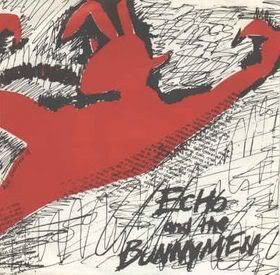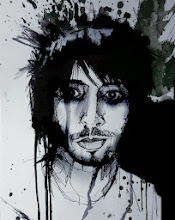Echo and the Bunnymen ; by Alan Mcgee


There was only one thing that stopped the hugely influential band from reaching the superstardom they deserved - themselves.
Nineteen eighty-nine was the year of a British and Irish invasion of North America: U2, the Cure and New Order were achieving significant sales and huge cultural status. Of this charge of the long coat brigade, the one band who should have made it was Echo and the Bunymen. Instead, that was the year they decided to break up. Their drummer Pete DeFrietas died a year later, and the band reconvened without singer Ian McCulloch for a sixth Echo and the Bunnymen album in 1990 that was met with reactions ranging from indifference to outright hostility.
Just two years prior to this, the future had been bright. With the release of their self-titled fifth album, the Bunnymen were set to achieve. They had two songs in high profile teen movies - Pretty in Pink and The Lost Boys - which increased their profile hugely, and Ian McCulloch's striking looks seemed ready-made for the MTV generation. The band toured with New Order and had a semi-hit with Lips Like Sugar. But instead of capitalising on it by doing an 18-month American tour, they merely faded away.
It's not that they didn't want world domination - they did. Ian McCulloch was the original rent-a-quote, dissing U2 before it was cool to do so, and telling every journalist who would listen that the Bunnymen were the greatest rock'n'roll band of all time, 10 years before Noel Gallagher-style self-aggrandisement became the order of the day.
So what happened? Would it have helped if McCulloch had pulled the same dumb moves as Bono that helped U2 become huge in the US, or if the Bunnymen had tried to become a little less weird? Did their own name eventually do them in?
In 1987, the Bunnymen were a long way from Eric's, the infamous post-punk nightclub that kick-started punk rock in Liverpool in 1978. Before that, Liverpool had been a hopeless cause, a city that was destined to remain in the shadows of the Beatles for good or bad. However, punk rock jettisoned the idea that the only way to distance yourself from the Tremolos and Merseybeat was to stab your keyboard with a Nazi dagger and go prog.
In 1978, three friends, Julian Cope, Pete Wylie and Ian McCulloch decided to form an imaginary band, the Crucial Three. The Crucial Three split before recording anything (Julian going on to form The Teardrop Explodes and Wylie turning into Wah! Heat), but it was Ian McCulloch who had the greatest success.
Teaming up with Will Sergeant, the two formed an iconic partnership comparable to Jagger and Richards. Instead of taking their musical cues from the Clash and the Sex Pistols, their band Echo and the Bunnymen was inspired by Scott Walker, the Velvet Underground, Television, the Doors and Jonathan Richman. By 1983, their credibility was firmly established with three albums of post-punk anthems and two genuine hits to their credit: The Cutter and Rescue. However, by the time that they came to their fourth, they had exhausted that sound. Instead they set about to write the greatest album ever - Ocean Rain, a beautiful, orchestral album that would be the band's greatest moment, yet sow the seeds of their destruction.
Ocean Rain still sounds remarkably contemporary, different and weird. The Bunnymen had made their grandiose pop statement five years before the likes of U2 and New Order. Unfortunately, Ocean Rain exhausted them. A creative paralysis was evident in their self-titled follow up in 1987, which would contain songs left over from the Ocean Rain sessions. 'Echo and the Bunnymen' also took the longest out of any of their albums to record. It was as if they realised they had hit their pinnacle and had nothing else to give.
Hugely influential, the Bunnymen sound reverberates today through the Verve, Flaming Lips, Franz Ferdinand and yes, even Coldplay. If they could have stuck around for a few more years in 1987, true, they could have had it so much better - but even though they burned out, they'll never fade away.
Alan Mcgee started a label called ; Creation .. They signed Ride , My Bloody Valentine , Primal Scream , Oasis and Jesus and Mary Chain . Alan Mcgee has new label called Poptones , he lives in the Uk
Mcgee @ Myspace

